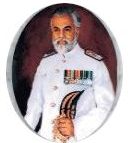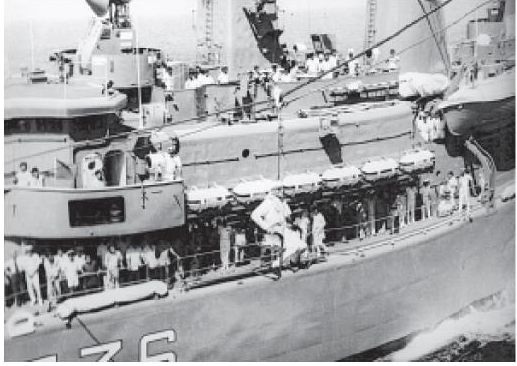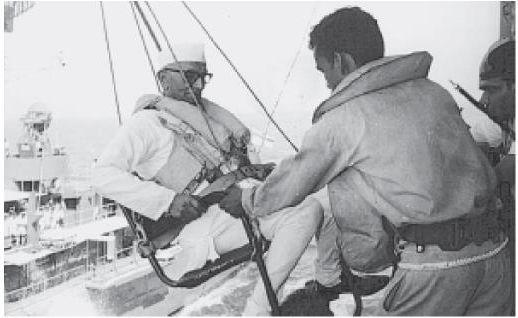Latest Contributions
Read More Contributions
Morarji Desai’s Visit to INS Shakti
Category:

Manohar Pralhad Awati was born in September 1927, had his schooling in King George's School, Mumbai, and The Maharashtra Education Society School, Pune. He was selected for the Royal Indian Navy in November 1945. He was awarded the Vir Chakra for his role as the Commanding Officer of INS Kamorta during the 1971 war with Pakistan. In March 1983, he retired as a Vice Admiral and the Flag officer Commanding- in-Chief of the Western Naval Command. His love for ecology and its conservation emerged after retirement, in association with the legendary Dr Salim Ali. His particular love for the conservation of the Lion and the Tiger was reflected in the books he edited Homo Sapiens and Panthera Leo and The Vanishing Indian Tiger. Another of his post-retirement ventures is the conception and founding of the Maritime History Society of India, a unique institution which sustains all of maritime research in India today.
Editor's note: This article first appeared in Quarterdeck, from where it is reproduced by permission from the author.
Shri Morarji Desai, Prime Minister, boarded INS Shakti by helicopter, off Cochin (now Kochi) one fine morning in February 1979.
Captain S. K. Gupta, MVC, NM (known in the Service as Gigi to his friends and admirers) was in command. I had, earlier, transferred my flag to Shakti.

From left: Helicopter Pilot, Prime Minister Desai, Vice Admiral Awati, Captain Gupta. Arriving on INS Shakti, February 1979

From left: Front, Prime Minister Desai, Vice Admiral Awati\; Second row: Mrs Kantibhai Desai\; Third row, Lt Cheema, Executive officer of ship. On INS Shakti, February 1979
The PM was a practicing Gandhian with quite a few of the Mahatma's fancies and foibles. The sprightly PM, well over 80 years old, ate only fresh and dry fruit. He drank only cow's milk. The bovine had to be dun coloured! Now, there indeed was a problem for the Fleet Commander. Even if I could find an animal of the requisite colour in a state (Editor's note: Kerala) not known for the variety of its scarce bovine population, how would I get her aboard and who would milk her?
I resorted to addressing the problem by bluff and bluster, a dun coloured animal standing by at the naval base, just in case. Fortunately, the PM never asked to see the animal, and was satisfied with my assurance that the milk he drank, during the next few days he was my guest afloat, was indeed sourced from an animal, of the prescribed shade.
Before units of the fleet had left Bombay for Cochin, the ship's Chief Steward had been sent scouring the bazaars for the very clearly prescribed and described fresh fruit and nuts which would form the PM's diet. The Admiral's suite was readied for the PM. The Captain vacated his suite for me, the Commander quit his cabin to accommodate his Captain, so on down the line.
Every night a very special glass tumbler of plain glass, crystal or any fancy glass was not appreciated, was placed in the Heads (Editor's note: naval term for toilet) for PM's use in the morning for collection and to drink from. We only knew that the PM had had his morning drink from the faint aroma of his person at close quarters. It was not an offensive odour but the aroma was unmistakable. (Editor's note: Morarji Desai practiced "auto urine therapy" (drinking one's own urine), which he believed kept him fit).
We sailed off from Cochin as soon as the Prime Minister was embarked. Everyone aboard was impressed by the physical fitness and agility of the PM, no mean feat at 83. Many years ago in Europe, I had seen Chancellor Adenauer of West Germany, head of a major European country at his age, then somewhere between 88 and 90. I was amazed then.
I was no less amazed at this Prime Minister. He was immaculately turned out in white khaddar kurta pyjama topped by a dark Nehru jacket with the inevitable white Gandhi cap on his head. He held himself erect, and spoke Hindi and flawless English with equal facility in a measured tone, as if he had chosen every word with great care.
Quite a man, I thought. He had earlier proven his administrative abilities as the Chief Minister of the erstwhile Bombay State before it was divided between Marathi speaking Maharashtra and Gujarati speaking Gujarat.
He walked around the ship, visited the engine room, spoke to as many officers and sailors he could, impressed them with his knowledge of the role of the ship and of the navy. This obviously was no ordinary Prime Minister.
In the afternoon, the PM readily accepted my offer for transfer by jackstay to the escorting ship, ignoring the restraint counselled by his personal escort from Delhi. "Admiral," he said to me in English, "these spoil sports around me, are always looking for an opportunity to restrain me from participating fully in my visits. I know fully well that you would not have asked me to, if you had the least doubt about my safety." He winked at this escort. Aplomb, I thought to myself, a seasoned politician and a leader!
The crew on both ships was charged-up to see a spirited octogenarian PM ready for the evolution. He was tickled when a heavy bag of cement was heaved across the jackstay as a pilot, preceding his journey across. The moment came the Prime Minister of India was ceremoniously transferred by jackstay to the escorting frigate (F 36), as he was piped over the side by Shakti, and received by F36.

Prime Minister Desai, centre, in jackstay on Frigate F36, ready to return to INS Shakti. February 1979
He was returned to Shakti by the same route, expressed praise for the manner in which the evolution was conducted.

Prime Miister Desai
I was personally very sure he would enjoy the experience, the view below him as his Bosun's chair was pulled over the ‘oggin (Editor's note: naval term for sea) from one ship to the other. It was a happy occasion, an evolution conducted with seamanlike precision. Nevertheless, there was that nagging anxiety until the old gentleman was safely delivered back to the flagship by the replenishment teams of the two ships. A loud cheer went up spontaneously as the PM waved back to the escort on his return to Shakti. Not every Fleet Commander has the opportunity to send his Prime Minister across the waters from ship to ship on a jackstay, I thought to myself.
The following morning on arrival off Kavaratti, the PM took off for the island in the ship's helo (Editor's note: naval term for helicopter.) This routine continued for all the Lakshadweep islands he visited during the cruise. He would rest in the afternoons, attend the variety entertainment laid on by the ship's company, talk to me and often with other officers of the Wardroom, and on three occasions to the senior sailors on the upper deck.
During one evening variety show, a Leading Telegraphist mimicked the Prime Minister so well that it brought down the house. The artist presented his version of the PM's now famous morning brew which so deceptively looked like the proverbial ‘Cup that cheers', but without the juice from the dun coloured cow which, for sure, tasted so agreeably different to our exalted guest!
The PM participated in the hilarity that followed. It testified to his sense of humour. After the entertainment, the Prime Minister said to me on an aside, "Admiral, that was a bit below the belt." I apologized, told him that I would ask the Commanding Officer to admonish the sailor, and said that in the Navy we do appreciate, even encourage such earthy, nautical humour. He smiled at me. An affable person, if ever there was one, I thought.
Prime Minister Morarji Desai was a Gandhian to the core, even to opposing manufacture of nuclear weapons by India even for self-defence. How can you defend yourself with such weapons? I said that the threat of their use may prevent their use. He did not agree. I found his thinking a bit woolly, doctrinaire Gandhi. He did not pursue the argument to its logical conclusion.
He must have been the most incorruptible PM we have had. It was amazing how he ran a Government as a coalition among parties whose only sticking principle seemed to be the opposition to the erstwhile Emergency proclaimed by Mrs Indira Gandhi. The Emergency had been voluntarily dismantled. It appeared to me that the Janata Party's coalition partners would melt away the moment Indira Gandhi made a comeback.
We returned to off Cochin a few days later. I bid good-bye to the Prime Minister.
Almost a year later, he was no longer PM, having been defeated at the polls by Indira Gandhi. As I had thought, his partners in the coalition began deserting him as Indira Gandhi's comeback became a possibility. Yashwantrao Chavan was among the first to go to return to the Congress fold. Others followed him. As Morarji Desai's Government became untenable, a general election appeared inevitable in early 1980. The rest is contemporary history.
Morarjibhai left an indelible mark on his hosts during that February in 1979 by his demeanour that showed a spirited Prime Minister, a memory etched in my mind.
______________________________________
© Manohar Awati 2014
Comments
Add new comment